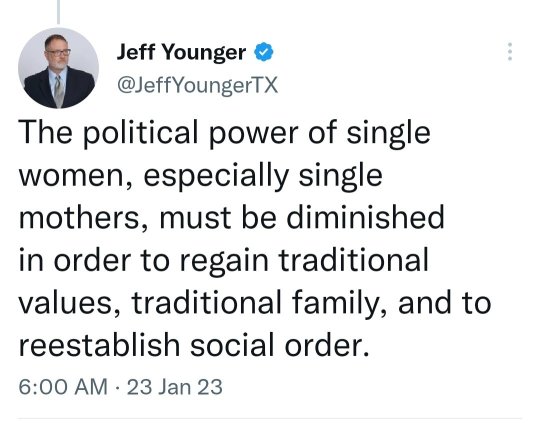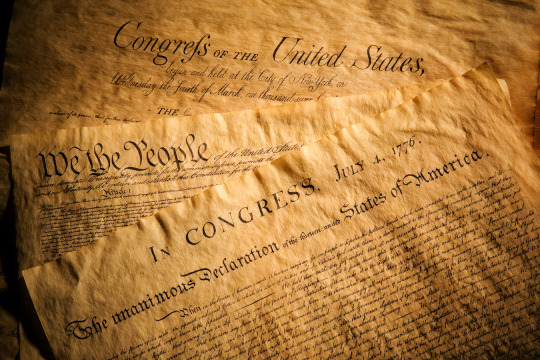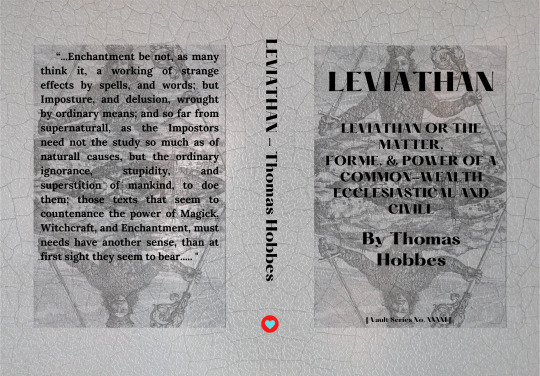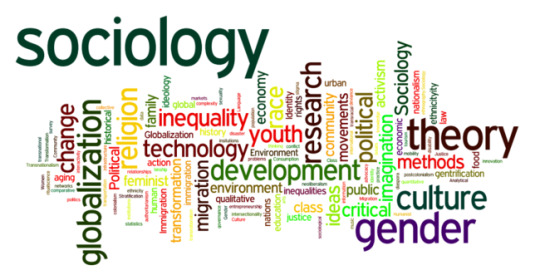#Social order
Photo


157 notes
·
View notes
Photo

Individual liberty is a social condition and both cause and effect of a particular kind of social order. License, by contrast, spells the disintegration of society and its fragmentation into a state of nature, as individual appetite becomes sovereign over social responsibility.
- Roger Scruton
#scruton#roger scruton#quote#individualism#society#community#politics#social order#social responsibility
71 notes
·
View notes
Text
youtube
Probably, some of the younger people online wonder why people my age complain about all the social strife going on. This is the world I grew up in, far different than the one we have today. Both socially, and economically, it was far more stable than the world as it is now. There is a short commercial at the beginning, and a longer one at the end, skip them both, but otherwise, reasonably accurate.
13 notes
·
View notes
Text
for when you’re making out covered in blood or whatever
#someone sent me an ask saying they miss when I post my playlists#so here is one in my constant rotation#go check it out and tell me what you think#music#mine#spotify playlists#888#vampires#narrow head#interpol#motionless in white#slipknot#pixies#mr kitty#boy harsher#sleep token#a perfect circle#jah phnx#nine inch nails#social order#sisters of mercy#deftones#she pleasures herself#mareux#misfits#him#bad omens#godsmack#Alice in chains#silent planet
2 notes
·
View notes
Text







#omni american#liberalism#classic liberalism#liberal ethics#social order#illiberalism#liberal society#equality#equality under the law#free speech#freedom of speech#religion is a mental illness
16 notes
·
View notes
Text
"Leviathan Unveiled: Navigating the Depths of Hobbesian Political Philosophy"

Thomas Hobbes' "Leviathan" stands as a seminal work in political philosophy, providing a profound exploration of the social contract and the nature of government. Published in 1651, during a tumultuous period in English history, Hobbes crafted a philosophical masterpiece that sought to address the chaos and disorder prevalent in society.
The central theme of "Leviathan" revolves around Hobbes' depiction of the hypothetical state of nature, a condition he famously describes as a "war of every man against every man." Hobbes contends that without a structured authority, human life would be characterized by constant conflict and anarchy. To escape this state of nature, individuals enter into a social contract, surrendering some liberties to a sovereign authority in exchange for protection and order.
The metaphorical "Leviathan" represents this sovereign power, a colossal entity with the authority to maintain peace and prevent chaos. Hobbes argues for the absolute power of the Leviathan, suggesting that a powerful centralized government is necessary to ensure the stability of society. This perspective, while controversial, laid the groundwork for later political philosophies and discussions on the role of government.
Hobbes' work also delves into the relationship between church and state. He advocates for a unified authority to avoid conflicts arising from religious differences. In his view, the sovereign power should control both the ecclesiastical and civil spheres to maintain social cohesion.
One of the strengths of "Leviathan" is Hobbes' systematic approach to political theory. He applies a scientific methodology, drawing parallels between the natural world and political structures. This analytical framework was innovative for its time, influencing subsequent philosophers and political thinkers.
However, "Leviathan" has sparked significant debate and criticism. Hobbes' advocacy for absolute monarchy and his rather bleak view of human nature have been challenged by later philosophers who championed individual liberties and more optimistic perspectives on human behavior.
In conclusion, Thomas Hobbes' "Leviathan" remains a cornerstone of political philosophy, offering a foundational exploration of the social contract, sovereign authority, and the structure of government. While controversial and subject to critique, its impact on the development of political thought cannot be overstated, making it an essential read for those interested in understanding the roots of modern political theory.
Thomas Hobbes' "Leviathan" is available in Amazon in paperback 19.99$ and hardcover 25.99$ editions.
Number of pages: 484
Language: English
Rating: 8/10
Link of the book!
Review By: King's Cat
#Thomas Hobbes#Political philosophy#Commonwealth#Leviathan#Ecclesiastical#Civil#State power#Social contract#Political theory#Sovereignty#Absolutism#Political authority#Human nature#Political science#Government#Power dynamics#Social order#Political structure#Statecraft#Absolute authority#Commonwealth theory#Civil society#Political obligation#Commonwealth formation#Political theology#Civic governance#Social contract theory#Authority and obedience#Leviathan symbolism#Hobbesian philosophy
3 notes
·
View notes
Text
the fact that shakespeare was a playwright is sometimes so funny to me. just the concept of the "greatest writer of the English language" being a random 450-year-old entertainer, a 16th cent pop cultural sensation (thanks in large part to puns & dirty jokes & verbiage & a long-running appeal to commoners). and his work was made to be watched not read, but in the classroom teachers just hand us his scripts and say "that's literature"
just...imagine it's 2450 A.D. and English Lit students are regularly going into 100k debt writing postdoc theses on The Simpsons screenplays. the original animation hasn't even been preserved, it's literally just scripts and the occasional SDH subtitles.txt. they've been republished more times than the Bible
#due to the Great Data Decay academics write viciously argumentative articles on which episodes aired in what order#at conferences professors have known to engage in physically violent altercations whilst debating the air date number of household viewers#90% of the couch gags have been lost and there is a billion dollar trade in counterfeit “lost copies”#serious note: i'll be honest i always assumed it was english imperialism that made shakespeare so inescapable in the 19th/20th cent#like his writing should have become obscure at the same level of his contemporaries#but british imperialists needed an ENGLISH LANGUAGE (and BRITISH) writer to venerate#and shakespeare wrote so many damn things that there was a humongous body of work just sitting there waiting to be culturally exploited...#i know it didn't happen like this but i imagine a English Parliament House Committee Member For The Education Of The Masses or something#cartoonishly stumbling over a dusty cobwebbed crate labelled the Complete Works of Shakespeare#and going 'Eureka! this shall make excellent propoganda for fabricating a national identity in a time of great social unrest.#it will be a cornerstone of our elitist educational institutions for centuries to come! long live our decaying empire!'#'what good fortune that this used to be accessible and entertaining to mainstream illiterate audience members...#..but now we can strip that away and make it a difficult & alienating foundation of a Classical Education! just like the latin language :)'#anyway maybe there's no such thing as the 'greatest writer of x language' in ANY language?#maybe there are just different styles and yes levels of expertise and skill but also a high degree of subjectivity#and variance in the way that we as individuals and members of different cultures/time periods experience any work of media#and that's okay! and should be acknowledged!!! and allow us to give ourselves permission to broaden our horizons#and explore the stories of marginalized/underappreciated creators#instead of worshiping the List of Top 10 Best (aka Most Famous) Whatevers Of All Time/A Certain Time Period#anyways things are famous for a reason and that reason has little to do with innate “value”#and much more to do with how it plays into the interests of powerful institutions motivated to influence our shared cultural narratives#so i'm not saying 'stop teaching shakespeare'. but like...maybe classrooms should stop using it as busy work that (by accident or designs)#happens to alienate a large number of students who could otherwise be engaging critically with works that feel more relevant to their world#(by merit of not being 4 centuries old or lacking necessary historical context or requiring untaught translation skills)#and yeah...MAYBE our educational institutions could spend less time/money on shakespeare critical analysis and more on...#...any of thousands of underfunded areas of literary research i literally (pun!) don't know where to begin#oh and p.s. the modern publishing world is in shambles and it would be neat if schoolwork could include modern works?#beautiful complicated socially relevant works of literature are published every year. it's not just the 'classics' that have value#and actually modern publications are probably an easier way for students to learn the basics. since lesson plans don't have to include the#important historical/cultural context many teens need for 20+ year old media (which is older than their entire lived experience fyi)
23K notes
·
View notes
Text
Sin, Offense, Guilt and Shame--Definitions, God's Work and the Social Order.
Defines the common sets of terms pertaining to sin, offense, guilt, shame and honor, with a discussion of God's work and initial comments on the importance of their confusion in maintaining the social order.
In this post, I will simply define some terms necessary to the remainder of this series and offer a brief discussion of the distinctions made, with minimal argument and citation of authority. These terms all occur in groups of three or four concepts that are commonly confused with each other in everyday use, in Christian preaching and teaching, and most pointedly in Christian hymns and worship…
View On WordPress
#barcode Christianity#confusion#guilt#honor#merit#offended#offense#Oz#punishment#rebellion#shame#sin#sins#social expectations#social order#society
0 notes
Text
Caste System: Series-Perception & Fact (Part 1).
Today, I’m going to be speaking on the Varnas in Varna-Ashrama Dharma, or the so-called “Caste System”, which is controversial and drives passions into overdrive. I’d urge that you keep a open mind and not let preconceived notions or for that matter generalizations color your judgement.
I present this to you here, via my website, www.sumirnagar.com. This will also be available in Video format on…

View On WordPress
0 notes
Text
youtube
0 notes
Text
"Leviathan Unveiled: Navigating the Depths of Hobbesian Political Philosophy"

Thomas Hobbes' "Leviathan" stands as a seminal work in political philosophy, providing a profound exploration of the social contract and the nature of government. Published in 1651, during a tumultuous period in English history, Hobbes crafted a philosophical masterpiece that sought to address the chaos and disorder prevalent in society.
The central theme of "Leviathan" revolves around Hobbes' depiction of the hypothetical state of nature, a condition he famously describes as a "war of every man against every man." Hobbes contends that without a structured authority, human life would be characterized by constant conflict and anarchy. To escape this state of nature, individuals enter into a social contract, surrendering some liberties to a sovereign authority in exchange for protection and order.
The metaphorical "Leviathan" represents this sovereign power, a colossal entity with the authority to maintain peace and prevent chaos. Hobbes argues for the absolute power of the Leviathan, suggesting that a powerful centralized government is necessary to ensure the stability of society. This perspective, while controversial, laid the groundwork for later political philosophies and discussions on the role of government.
Hobbes' work also delves into the relationship between church and state. He advocates for a unified authority to avoid conflicts arising from religious differences. In his view, the sovereign power should control both the ecclesiastical and civil spheres to maintain social cohesion.
One of the strengths of "Leviathan" is Hobbes' systematic approach to political theory. He applies a scientific methodology, drawing parallels between the natural world and political structures. This analytical framework was innovative for its time, influencing subsequent philosophers and political thinkers.
However, "Leviathan" has sparked significant debate and criticism. Hobbes' advocacy for absolute monarchy and his rather bleak view of human nature have been challenged by later philosophers who championed individual liberties and more optimistic perspectives on human behavior.
In conclusion, Thomas Hobbes' "Leviathan" remains a cornerstone of political philosophy, offering a foundational exploration of the social contract, sovereign authority, and the structure of government. While controversial and subject to critique, its impact on the development of political thought cannot be overstated, making it an essential read for those interested in understanding the roots of modern political theory.
Thomas Hobbes' "Leviathan" is available in Amazon in paperback 19.99$ and hardcover 25.99$ editions.
Number of pages: 484
Language: English
Rating: 8/10
Link of the book!
Review By: King's Cat
#Thomas Hobbes#Political philosophy#Commonwealth#Leviathan#Ecclesiastical#Civil#State power#Social contract#Political theory#Sovereignty#Absolutism#Political authority#Human nature#Political science#Government#Power dynamics#Social order#Political structure#Statecraft#Absolute authority#Commonwealth theory#Civil society#Political obligation#Commonwealth formation#Political theology#Civic governance#Social contract theory#Authority and obedience#Leviathan symbolism#Hobbesian philosophy
0 notes
Text
Survivors in Wilderness
Do you ever see wild animals?
#Home
Wilderness spares none and no animal on earth is as wild as the same wilderness it needs to survive. The intrinsic nature of man is being wild because that’s how he started his journey through civilization. From the time he made his spears and hunting with weapons to the time he developed his habitat in a social order of communities as we live in today,…

View On WordPress
0 notes
Text
On the "rules" of language, and falling in love
Language is arbitrary. That is, people made up languages. And while people were doing so, there usually wasn't a council deciding each nuance and ink stamping in big bold that “these are the RULES”.
Instead, natural languages evolve naturally. As a patchwork of isolation, varying distances, trade, fads, oppression and various other conflicts, including straight-up war. And also in the pursuit of friendships, and love.
Sure, we sometimes spot patterns here and there. And in school teachers call those rules. But those "rules" are just training wheels. School introduces a version of a language that is smaller than the real thing. This is to help us remember. To keep us from being quite as overwhelmed. Or to enforce an oppressive social order.
After a certain point, hopefully we want to experience a more authentic version of a language. If we don’t eventually toss off the training wheels of rules, they’ll hinder us from experiencing the full, complex flavor of our languages.
.:..:..:..:..:..:..:..:..:.
If you are in school, learning a language, and hate it or find it outrageously stressful. I hope you'll come back after you exit school. Don't worry about memorizing the rules this time around.
Put down that old habit of anxiety. Just spend time with the language now. Make friends with it. Like when we make friends with people, we slowly get to know someone over time. We soak them in when we spend time together. The more exposure, the more we begin to get a sense for prediction. And if you start to feel that old stress, make a cup of tea. Do something soothing. Remind yourself that you can make mistakes. There is no report card this time. It is just you, the language, and your curiosity.
.:..:..:..:..:..:..:..:..:.
You get to set your own goals. It can be fluency. But, it doesn't have to be. If you are wondering what other goals there are besides fluency? Plenty. You could order a meal in a different language. Or write a haiku. You could get a penpal. Or understand dialogue in a video game.
If fluency is your end goal, make it a priority to set smaller goals along the way. You'll need those to keep you motivated over the years. Make those goals challenging enough to keep your interest. But not so challenging that you're intimidated away. A good challenge doesn't drain you. It motivates you. If you find yourself floundering, change your challenge. Set a different goal. Seek out that motivation.
.:..:..:..:..:..:..:..:..:.
I didn't like English class in school. But after, on my own time, I fell in love with learning languages. I hope you will too. ~
1 note
·
View note
Text
On Deity and Divinity
To borrow a question my parents thought I might have the capacity to answer by age 5: What is God?
If we are to imagine an incomprehensible life force, let us suppose there are two essential types: institutional, from the top down; and endemic, from the ground up. For the sake of convenience, here I will reduce the entire spectrum, from saintly to supernatural, to "gods."
The institutional gods reign over particular regions by supernatural might and by their dynastic virility; following groups like the Dorians and Ionians to settle/dominate someone else's world, as the situation presents. These deities, having slash-and-burned their way across the Untamed Wild, then set about reproducing their own reality on top of the ashes.
The endemic gods are, by their nature, less easily defined. When the Romans brought interpretatio romano to Britannia, they left behind scores of altars to various genii loci, local gods. Many represented natural phenomena -- Coventina, clean water springing from the soil; Grannos and Sulis, the hot springs -- but the most common veneration was to the spirit of the crossroads, to language and its oaths. Every local Mercury was not not-warlike, but had the capacity to start with an olive branch* before resorting to the club.
I must pause here to trouble my easy distinction between what is institutional and endemic. It is easy to suppose that Jupiter, son of the Phrygian Kronos, ruled the Aegean and Tyrrhenian by thunder and bolt; meanwhile, that Camulus Mars embiggened the spirit of Caradoc and his other freedom fighters against Caesar, the avatar of Jupiter. But whose god was Camulus? and whom did he depose? We'll never know the complexities of indigenous realpolitik, in part because the presence of our written sources** destroyed the source material.***
Ideally, the practice of interpretatio**** builds upon extant power structures and, by contextualizing the status quo within a symbiotic hegemony, offers to incorporate "the smallfolk" into the fold of Imperial Civilization. In the name of lasting peace, the people were allowed to retain their local divinities, so long as they also venerated their numismatic deity ROMA.
While the deity's name and form have shifted from the Eve of Latium to the Sun-Fish of Nazareth, the numismatic structure reappears. Western society stands upon the shoulders of paranoid Christianized societies, driven by fear to out anyone who might be incurring God's wrath. These days, after surviving the Satanic Panics, Red Scares, and literal witch-hunts, it is easy to find nonbelievers at church, simply trying to pass in their community. Theoretically, anyone can get along by saying "God bless" and "Amen," so as to comfort the faithful/fearful.
As Nietzsche taught in The Birth of Tragedy, the Apollonian social order stands for that which is visual, perfected, and permanent; while the Dionysian stands for the unbound freedom of the Promethean spirit. In America, the Apollonian Puritans worked tirelessly to venerate the Pure and Ineffable by eradicating any devilish Dionysian aspects they might perceive.***** While secular Deist factions balanced these impulses in the 18th century, and 19th-century Romanticists revived Pan and Artemis for their pseudo-Christian mystery rites, the divinity of the paganos persists in the image of The Lamb; or Sol Invictus; or Buddy Jesus; the avatar of YHWH, the storm-deity of the Levant.
In the face of all of this, I cannot say that I believe in any of these deities; but neither can I allow myself the easy out of repudiating them. For those who believe, they exist as the pinnacle of culture: the divinity, for what can be changed; the deity, for that which can only be accepted.
But even while we accept The Deity and His Power -- render unto Caesar that which is Caesar's -- may we yet retain our divinity under duress.
*or a cup of mead; to each their own.
**Julius Caesar & friends
***the Druids of Mona, traditionally regarded by the Gauls as the center of oral knowledge in the West
****not new to the Romans, or to the empires they borrowed from; see: Sobek/Re
*****one imagines for their War on The Devil the satirical TSA signs from 30 Rock: "See anything, say anything"
0 notes
Text
i vote that next year instead of reading Dracula we do a Jeeves & Wooster Book Club. those two never got the rabid tumblr shipping fandom they deserved (disqualified for the sheer technicality of being published a century too soon). we must correct this injustice
#jeeves and wooster#i want to watch tumblr go rabid i want to watch ao3 overflow with jeeves/wooster fanfiction#yes obviously the fandom EXISTS but it's a cozy little neighborhood#a handful of talented artists and writers doing their best to keep their charming little village going#but i'm tired of cozy i want this fandom TRENDING#I WANT TO SEE THIS ON MY DASHBOARD PEOPLE#i swear to you if they made a shiny new tv series tumblr would absolutely obsess over these characters. good omens levels of obsession#it's just such a great dynamic! the good-natured overly-trusting bumbling idiot in constant need of rescuing!#the stoic all-knowing genius who quietly masterminds mayhem in order to protect this one moron he's devoted himself to for some reason#jeeves as a morosexual is just such a beautiful interpretation of the original text#wooster as a happy-go-lucky himbo who stumbles his way into a relationship with a protective caring and supremely competent mastermind#the angst and social complexities of a same-sex cross-class relationship in turn-of-the century london!#oh AND half the stories are about jeeves helping wooster get out of engagements/desperately avoid marriage#two men who live together constantly scheming to maintain their bachelorhood. this is quite literally the main plot point#the gay subtext is there! the gay subtext is there and very ripe for picking!!!#this thing is LOCKED AND LOADED we can pounce literally any time
10K notes
·
View notes
Text
Losing my mind at seeing Twitter Discourse where a girl talks about being a waitress and how sometimes people don't acknowledge her or reply to her at all when she speaks to them and how it feels dehumanising and all the people in the replies are like UM. SOME OF US HAVE /SOCIAL ANXIETY/ You're literally an evil person for wishing people would treat you with bare minimum decency :/ like idk how to tell you this but if a waitress asks how your evening is while she's taking you to your seat in a restaurant and you're gonna pretend saying "Fine, thank you" is a horrific arduous task like. Maybe you're just a massive cunt? Maybe you're just an insufferable fuckwit?
#i loveeeeee when people use social anxiety as an excuse to be rude like lmao#i get anxious sometimes and i can be awkward as fuck#but a two word 'Good. Thanks.' really is not that fucking difficult good god#especially since she stated theres been times when multiple customers will totally ignore any greeting and bark orders at her like.#youre just rude bro thats all that is
9K notes
·
View notes